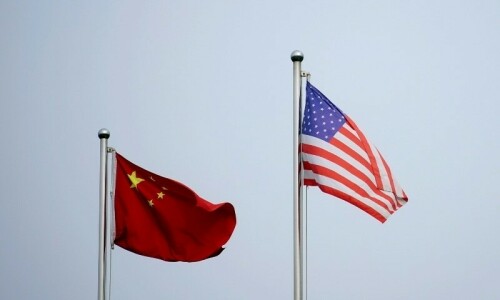VIENNA: Indirect talks between Iran and the United States on reviving the 2015 Iran nuclear deal are close to reaching an agreement, the chief British envoy said on Friday as she and her French and German colleagues flew home to brief ministers.
“We are close. E3 negotiators leaving Vienna briefly to update Ministers on state of play. Ready to return soon,” Stephanie Al-Qaq said on Twitter, referring to the chief British, French and German diplomats involved in the talks.
Despite the British diplomat’s teasing Twitter post, two sources with direct knowledge said there was still no deal and European and Iranian officials said that Iran’s lead negotiator Ali Bagheri Kani was staying in Vienna.
Negotiators have worked for 11 months to try to revive the 2015 deal under which Iran limited its nuclear programme to make it harder to obtain fissile material for a bomb — an ambition Tehran denies — in return for relief from economic sanctions.
European diplomats to consult with ministers; Iran says West’s haste cannot prevent observance of country’s red lines
Iranian Foreign Minister Hossein Amirabdollahian said on Friday the West’s haste to reach a nuclear deal cannot prevent the observance of Iran’s red lines, including economic guarantees.
Negotiations on reviving the 2015 accord appear near a climax, amid talk of an imminent ministerial meeting. Such a meeting, said Amirabdollahian, requires full compliance with the red lines. “Our delegation will continue to work hard to reach a final and good agreement, Iranian media quoted Amirabdollahian as telling the EU’s top diplomat Joseph Borrell by telephone.
“We are ready to finalise a good and immediate agreement,” he said, adding: “Most of Iran’s requests have been considered in the upcoming agreement.”
The United States said Thursday that “a possible deal” on a new Iranian nuclear accord is close but several sticking points have prevented an agreement and time is running out. Negotiators meeting in Vienna to try and salvage the 2015 nuclear deal have made “significant progress,” State Department deputy spokeswoman Jalina Porter told reporters, echoing other nations in recent weeks.
“We are close to a possible deal, but a number of difficult issues still remain unsolved,” she said. “We will not have a deal unless we resolve quickly the remaining issues,” she added.
However, “if Iran shows seriousness, we can and should reach an understanding of mutual return to full implementation of the JCPOA within days,” she said, using the acronym for the 2015 accord.
On Thursday, the chief Russian diplomat at the talks said he did not think they would now collapse and a ministerial meeting — typically where a deal would be blessed — was likely but he could not say if it would be on Saturday, Sunday or Monday.
However, there are myriad pieces that must fall into place for a deal to come together. One wildcard is an effort by the International Atomic Energy Agency (IAEA) to resolve questions about nuclear material that the Vienna-based agency suspects Iran failed to declare, another obstacle to reaching an agreement to revive the deal.
IAEA Director-General Rafael Grossi will travel to Tehran on Saturday hoping to agree on a process that would lead to the end of the investigation, potentially clearing a way for the wider agreement, diplomats said.
Published in Dawn, March 5th, 2022













































